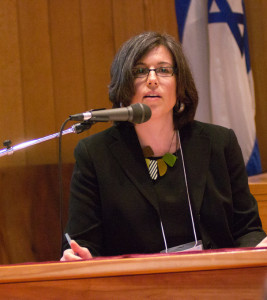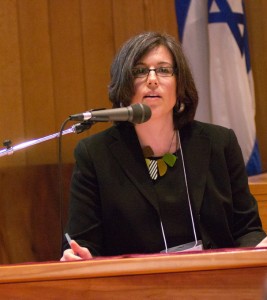Karla Van Praag
I believe that our work aligns with all four propositions.
Wisdom/Chochmah
There is a middle ground between giving people what they want and giving people what they need. Organizers, like rabbis and educators, need to meet people where they are if we want them to be responsive, but we can’t just encourage them to sit satisfied where they are, we have to help them move somewhere else. This proposition encourages us to think deeply about how we bridge this gap thoughtfully. JOIN wants to share the wisdom of Jewish organizing: the texts, traditions, stories, old and modern history of Jewish leadership and change-making. Our traditional in-person training has limitations in terms of scalability and financial viability. We wanted to figure out a way to introduce these important Jewish frameworks to many more people in a way that fit into people’s busy lifestyles, and that is familiar to people not yet ready to jump into organizing, yet we didn’t want to sacrifice substance over style. We wanted it to be a commitment as well.
In September 2015, we launched a national online course called Don’t Kvetch, Organize! (DKO) that enabled the large-scale mobilization of Jews across the country to shift the cultural understanding around inequality and act for justice. In consultation with people experienced with online learning, we developed an innovative hybrid online/offline model that included asynchronous video learning, synchronous online learning sections (with in-person sections in LA, Philadelphia and DC), online discussion forums and weekly course assignments, and opportunities to participate in justice actions on the ground in participants’ communities. The work load was approximately three hours per week for seven weeks, and students were supported in small groups by experienced Course Instructors.
This online course has the potential to be a game changer for this field, opening new ways of understanding a faith-based model for social change that can be useful in a variety of other contexts and training and mobilizing leaders on a much larger scale than we have previously accomplished. One hundred and ninety-three people took the course the first time it was offered, almost half of them young adults under 35. We plan to provide two more rounds of DKO in 2016 and to train 1,000 leaders over the next two years with this program.
Social Justice/Tzedek
JOIN for Justice envisions a revitalized Jewish community that plays a powerful role in this country’s social justice struggles. We train and mentor Jewish leaders, rabbis, and community organizers through our yearlong organizing fellowship program, our seminary leadership program, our Clergy Fellowship, online classes, and consulting work with organizations.
When we decided to expand our mission from our Jewish Organizing Fellowship to become JOIN for Justice, there was a vigorous debate by the board about whether the word “Justice” was required in our name. Couldn’t we just be the Jewish Organizing Institute and Network (JOIN)? Justice, in truth, is only a part of what we teach. Often in our leadership and synagogue training it is off in the distance, and not an explicit outcome, at least initially.
Yet the board and the organization decided it is crucial both to our mission and to our messaging to include the word Justice in our name. Justice is part of the vision people resonate with. Justice is what the methods we teach is moving towards, even if it is not explicit.
This quote from the book resonated tremendously with me: “Because next generation Jews more closely identify as covenantal Jews than as tribal Jews, the only way to reach them is to make sure that the Judaism they experience as youth reflects Judaism’s millennial commitment to tzedek, justice.” Young people come to our organization for the justice, and sometimes only reluctantly explore their Judaism. Our work is moving them from “despite being Jewish” to “because I am Jewish.” Without explicitly committing to it, we lose the opportunity to engage what is already intrinsic to who we are. Why not embrace that which can be claimed already?
Community/Kehillah
The definition of community has changed. Young people don’t think they need physical spaces to build community anymore; online communities seem sufficient. Yet when people have intensive experiences of physical community building, these communities can have lasting effects on their lives both in specific and how they engage going forward. In our Jewish Organizing Fellowship, Fellows spend a year working with secular and Jewish social justice organizations and receive high-level training in leadership and community organizing skills. At the same time, JOIN Fellows are engaged in intensive Jewish reflection and study which connects their passion to build a more just world with Jewish values. As a community, we focus on teaching the idea that community requires commitment. Our Fellows spend a significant amount of time learning about covenant as a concept, building one with each other, and then using it to hold each other accountable throughout the year. I would argue that the Jewish community will be stronger if we don’t just simply bring likeminded folks together for learning and fun, but that we include deep learning about how to listen and how to struggle when we disagree. These lessons will be transferable to future Jewish communities they are part of. They learn how to build relationships and see changing one’s community as part of the obligation to be part of a community.
Lives of Sacred Purpose/Kedushah
Sacred purpose is perhaps the least concrete and measurable outcome of relational organizing, yet it is its most meaningful. I believe it is the reason people “drink the Kool Aid” of our work, the reason people keep coming back. When people learn to relate to others, to hear their stories, to figure out their own stories, to figure out what they can actually do about it, what they are actually doing is finding meaning in their own lives, their sense of purpose. They discover the agency to do something about the problems they or others are experiencing. They do not feel alone. I have heard more than one person say that they first felt the presence of God in a one on one, a key organizing methodology.
Synagogues and their leadership must be radically transformed to understand how to engage people around the challenges of their lives. Listening to their congregants is key. We have the ability through teaching people to relate and act to help people navigate our current society’s malaise.
_______________
Karla Van Praag is the second Executive Director of the Jewish Organizing Initiative, re-named JOIN for Justice in 2012. The organization trains thousands of Jewish leaders across the country in how to use community organizing to strengthen Jewish communities and create social justice. Karla holds a Master in Public Policy from Harvard’s Kennedy School of Government.



